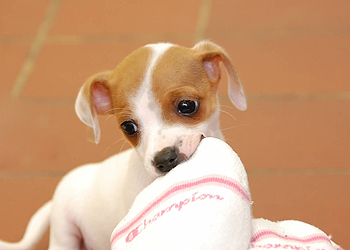Available Animals
Adopting with Us
 So You Want to Adopt a Puppy…
So You Want to Adopt a Puppy…
Few can resist a puppy. These beautiful, soft bundles of energy are, in many ways, like four-legged children with tails. And, like children, puppies need a lot of time, care, love and understanding. These adorable furballs will depend on you for frequent and regular feedings and walks, for guidance and training, for a lot of your time and a lot of your love.
So before you plunge into puppy parenthood, take time to conduct some research. Become acquainted with all that having a puppy involves. While the rewards really are many, in reality, so are the requirements.
- Picking the Right Pup
- Preparing for the Big Day
- Bringing Puppy Home
- Send Your Puppy to School
- Resources
Picking the Right Pup
We are against purchasing a puppy from a pet store, as many sell puppies who were born and raised in “puppy mills,” inhumane breeding factories whose dogs often develop physical and/or temperamental problems. Find out which breeds, or mixes, fit your lifestyle. How big will he grow? What are his exercise needs? Take time to get to know several puppies before selecting the newest member of your family. In The Chosen Puppy, Carol Lea Benjamin offers some guidelines and “tests” for picking the puppy who is best for you.
Preparing for the Big Day
Do as much as possible for your new toddler-with-a-tail before the big homecoming day.
- Shop for a crate, a collar and leash, food and water bowls, a bed and chew toys of different degrees of hardness and ID tags. For a complete, well-explained list of all your new little toys dog will need, check out I Just Got a Puppy. What Do I Do? by Mordecai Siegal and Matthew Margolis.
- Buy food. If possible, find out what your puppy’s been eating and — assuming it provides complete nutrition for a puppy — buy a bag of this.
- Rearrange your schedule. Housetraining your puppy means training him to urinate and eliminate outside on a schedule you determine. To do this successfully, you will need to establish and strictly adhere to a predictable feeding and walking routine. Very young puppies (two to three months old) need to eat a measured meal at least three times a day, and should be taken outside to eliminate shortly after each feeding.
- If necessary, hire a petsitter. Here’s the solution for puppy parents who work outside the home and who cannot return home several times during the day. Ask a friend or neighbor to feed and walk your dog, or hire a professional petsitter to take care of your pooch. Interview prospective caretakers and hire your selected “surrogate” mom or dad before you bring your puppy home.
Bringing Puppy Home
The single most important thing to do for your new puppy is to bond with him. Creating and deepening this emotional tie with your dog will make obedience training easier, behavior problems fewer and less intense, and will enhance your enjoyment of your dog. Give your dog a friendly name and use it frequently; feed your puppy with affection; walk your dog with pleasure and excitement; comb and brush him gently; exercise him in a playful manner.
- Your puppy’s first night (or two, or three, or four) will very likely be memorable. That’s a nice way of saying, expect the worst. PHS/SPCA advises having your new dog sleep in your bedroom, but not in your bed. (Or at least not until you know your dog better and can be sure sleeping on your bed will not exacerbate an overly confident or dominant dog’s desire to be the alpha dog in his new pack.) Expect your new puppy to wake you several times during the first night with his cries, barks or even howls. Quite simply, he’s stressed out, frightened, insecure. He may also have to urinate or eliminate. Take care of his needs, be comforting and caring. Above all, do not yell or be impatient; this will only increase your puppy’s stress. All should calm down soon enough.
- Don’t hesitate to fine-tune strategies or ask the advice of experts. At PHS/SPCA, biting and housetraining are by far the two most frequent puppy questions asked the behaviorists who answer calls at our Animal Behavior Helpline (650-340-7022, ext. 783 and in Spanish ext. 786).
- Don’t overlook the need for socialization. People just assume that their dog will get along with other dogs — and with humans outside of their family. Without proper, supervised socialization, this is often just not the case.
- It almost goes without saying that you should establish a good relationship with a veterinarian you trust to take care of your new companion’s various health needs. Your veterinarian will cover the specifics of canine healthcare with you, so we’ll just say three words: vaccinations — and spay/neuter.
- A spayed/neutered dog is easier to train, will concentrate better on you, is much less likely to fight with other dogs, is less pressured to mark territory with urine (both indoors and out), and has less desire to get away from you and roam. Neutered dogs make gentler, calmer companions. Altered animals avoid certain health risks, such as pyometra (a life-threatening infection in females), and have a lower risk of other serious problems such as breast cancer in the female and prostate cancer in the male. Spaying/neutering shows the world you care. An altered dog lives a longer and healthier life — and does not contribute to pet overpopulation.
Send Your Puppy to School
Is your new dog a perfect student? Find out at PHS/SPCA’s Puppy Preschool, an eight-week class designed especially for dogs 2-4 months old. For puppies age 4-6 months, we offer Puppy Kindergarten. The puppies learn basic obedience exercises; but the primary purpose of the class is to give puppy owners tools for raising well-socialized canine companions who are housetrained who no longer nip, and who regard the humans in the family with respect. Puppy classes are also a great forum for exchanging ideas and experience with other puppy parents. For the puppies, there’s a 15-minute off-leash socialization and playtime.
Resources
-
Before You Get Your Puppy by Ian Dunbar
-
After You Get Your Puppy by Ian Dunbar
- Parenting Your Dog by Trish King
-
Perfect Puppy in 7 Days by Sophia Yin
- Culture Clash by Jean Donaldson
-
Doctor Dunbar’s Good Little Dog Book by Ian Dunbar
